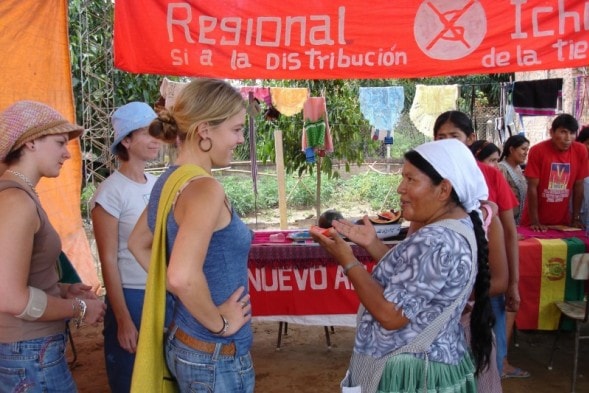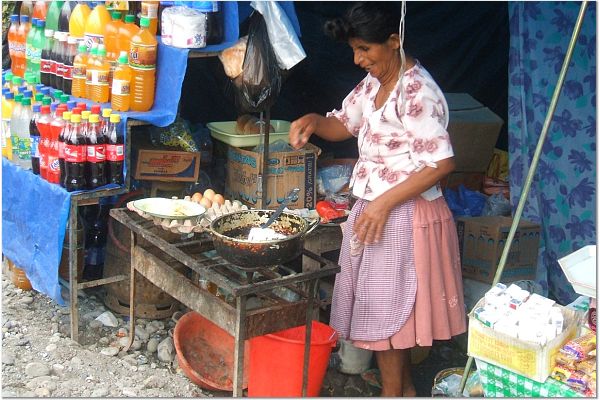September 28 – October 8, 2006
In partnership with Global Exchange, our Bolivia Transformative Advocacy Exchange led a team of women environmental attorneys to journey through the agricultural lowlands of Santa Cruz, to the politically-organized indigenous communities in the Andean highlands of La Paz.
Our group shared dialogue and forged working partnerships with women-led community organizations working to encourage sustainable, indigenous-managed land use and agricultural practices in Bolivia.

AT A GLANCE
About 80% of the Bolivian soy crop is genetically modified.*
7% of women in Bolivia have no education. This affects the nutritional habits of families. About 24.5% of households with children under 5 do not have access to safe drinking water, making food preparation difficult.*
In Bolivia, soybean production is expanding towards the east, and in many areas soils are already compacted and suffering severe soil degradation.*

Background
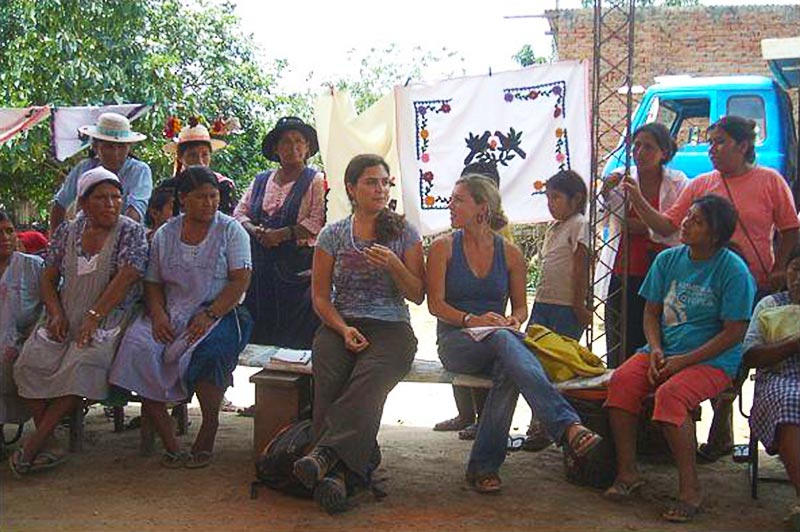
Bolivia is a culturally vibrant, resource-rich and economically depleted nation. Political tensions often spark large-scale demonstrations and street activism, as seen during the summer of 2005; the December 2005 election of indigenous leader Evo Morales to the presidency ensures the continued transformation of the political process in the coming years.
Bolivia’s indigenous population continues to fight for economic justice and autonomy over resource management, especially with respect to water, gas, coca and mineral extraction. Women serve as leaders in the movements against policies which destroy critical environmental resources, further impoverish the people of Bolivia, and fragment communities.
In the fall of 2006, WEA launched Transformative Advocacy: Collaborating Towards Environmental Justice in partnership with Global Exchange. Together we facilitated a transformative journey through Bolivia with a team of women environmental attorneys and advocates. From the agricultural lowlands of Santa Cruz, to the politically-organized indigenous communities in the Andean highlands of La Paz, our group met with, learned from, and forged partnerships with women-led community organizations working to halt the proliferation of genetically-modified soy in Bolivia.
The Advocacy Delegation worked with a multitude of women activists and women-led community groups working to promote local agriculture, preserve native agricultural technologies, and end the destructive large-scale cultivation of GM soy. Our group traveled throughout Bolivia to visit soy fields, toured a native seed-saving foundation, met with internationally-active land rights organizations like Movimiento Sin Tierra, and spoke with government ministers and environmental lawyers. The work in Bolivia situated us at the politically dynamic intersection of the Bolivian movement for nationalized control of land and resources, women’s stewardship of agricultural production, and international trade policy.
Delegates
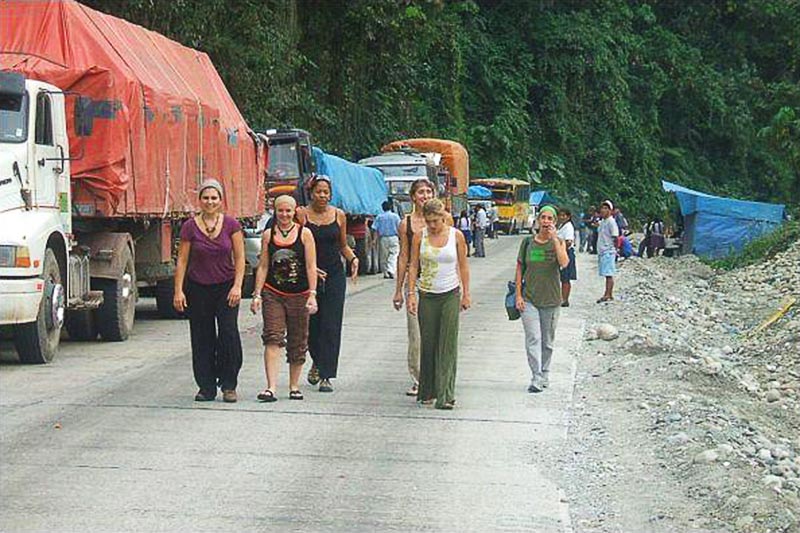
Our delegates came from all parts of North America: the western, southern, and eastern United States, as well as Canada. The team included a water rights attorney for the U.S. Department of the Interior; an advocate for safe and sustainable housing in post-Katrina New Orleans; a Ph.D. student researching the impacts of genetically-modified crops on local ecosystems and economies; and an environmental justice attorney advocating for the elimination of toxins from New York City schools, among others.
Focus
We focused primarily on the social, economic and biological impacts of genetically-modified soy, a crop that is taking root across South America. We learned about the deforestation, risks to biodiversity, and adverse human health effects that accompany the proliferation of GM soy. This focus acted as an entry point for our learning about environmentally and economically sustainable agriculture, the highly controversial politics of natural resource autonomy in Bolivia, and indigenous-led movements for sovereignty and localism throughout the country.
During our meetings with women indigenous leaders, soy and coca growers, and urban activists, we learned about the nuances and complexities of land use politics in a resource-rich nation that is deeply impoverished and indebted to transnational economic institutions. In these conversations, we witnessed the incredible power that emerges when women gather together to act on the local level – whether they were working to build clean water wells, organize a consumer awareness campaign around genetically modified foods, or govern a city, these women effected significant change, acting in solidarity with one another and with the larger social movements characterizing the Bolivian political landscape.
TRANSFORMATIVE ADVOCACY
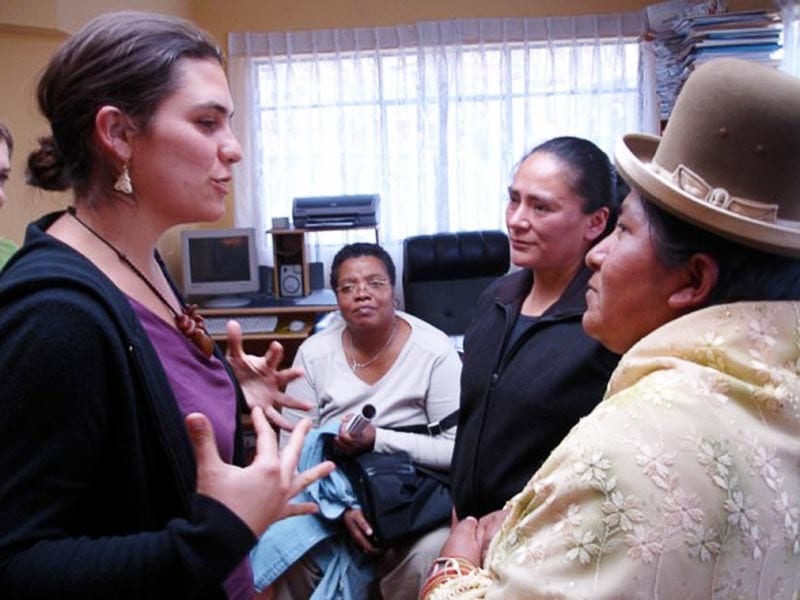
Our team partnered with:
- Tierra Viva, a non-profit seeking to build awareness among the Cochabamba community regarding the risks of genetically-modified soy. We engaged in ongoing research and strategic development.
- The Bolivian Forum on Development and the Environment (FOBOMADE). We connected a lawyer to work with FOBOMADE staff, doing research, capacity-building, and organizational support.
- The Cooperative of Economic Peasant’s Organizations (CIOEC). We investigated the creation of a web marketing system for the group’s organic, sustainably-harvested agricultural products.
Finally, our journey opened the delegates’ minds to the fundamental connections between the work of women environmental and social justice advocates in the Global North, and the work of women within environmental and political movements in Bolivia.
Special thanks to Caitlin Sislin and Malia Everette for their leadership in this work.


